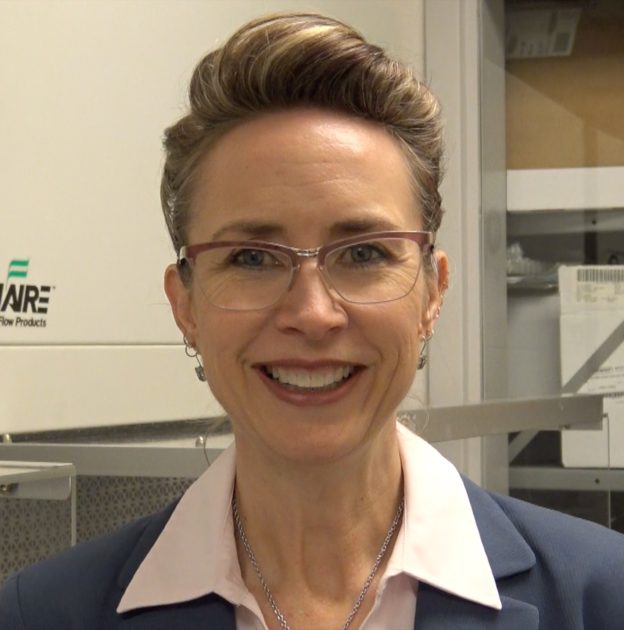 Who is Marni Landry?
Who is Marni Landry?
Some of us at Educator CIRCLS recently had the pleasure of talking to educator Marni Landry. Marni has been the K-12 STEM Outreach Manager at Grand Canyon University for about three and half years where she spends her time coordinating STEM professional development for teachers and amazing summer camps like GenCyber cybersecurity, with partner Cori Araza for students and teachers. Before coming to GCU, Marni taught high school science for 16 years. She wrote the STEM Integrated curriculum for, and taught in the Center for Research, Engineering, Science, and Technology program on the Paradise Valley High School campus.
Outside the classroom, Marni has been a leader in the teaching community. She served on the Paradise Valley Technology Committee, designing and delivering technology PD to staff and delivering biotechnology PD as a BioRad fellow. She has also presented STEM PD for the National and Arizona Science Teachers Association (ASTA) and has served as their committee chair. In addition, she partners with MESA (Math Engineering Science Achievement), HOSA-Future Health Professionals, and the Society of Women Engineers (SWE).
Marni’s passion for teaching and learning was evident throughout our conversation, so it was no surprise to learn that her passion and impact have been widely recognized by various organizations. Marni is a recipient of the Presidential Award for Excellence in Science and Math Teaching, a Nobel Top 10 Teacher of the Year, AZ High School Science Teacher of the Year, Arizona Tech Council Teacher of the Year, IEEE Pre-College Teacher of the Year, Arizona Bioindustry Association Educator of the Year, and a Fellow of the Fulbright Teachers for Global Classrooms.
What’s one thing you really care about getting right as an educator?
Even though she’s been out of the classroom for a few years, Marni definitely maintains the heart of a teacher and still works through that lens. When asked what she really cares about getting right as an educator, she said, “Getting people to love learning and getting people who say ‘I can’t’ to say ‘I will.’ Learning is not a task. It’s an adventure! I want them to say, ‘Yeah, this is hard, but that’s the fun part!’”
What are you most proud of in your career?
When asked what she’s most proud of in her career, Marni first pointed to her students’ successes. She said that she has been fortunate to build relationships with so many students and to still be part of many of their lives. “Seeing their success is what I’m most proud of. Other people may not always have seen what I saw in them, but I fought tooth and nail for them. So to see them succeed is what makes me most proud.”
Marni also pointed to a proud personal moment–winning the Presidential Award for Excellence in Math and Science Teaching. She took away something profound from that experience in addition to the recognition. “I didn’t think I was PAEMST material, but my mentor was convinced that I was. I didn’t even think I could go through the application process, but my mentor said I could do it and that she would help.” Marni realized her mentor’s investment in her had a trickle down effect on her students. “They might not think they’re the right material, but I believe they are. They might not think they can accomplish certain things, but I think they can and I can help.”
What are some of your favorite educational technologies?
You can tell Marni frequently uses tech tools because she had several favorites in her back pocket. Here are a few she mentioned:
- Data Nuggets
- Labxchange
- Jamboard
- Whiteboard.chat (this was a new one to us and it looks great!)
- Classroomscreen
- Poll Everywhere
- Slido
- Mentimeter
You can check out Marni’s Tech Tools Wakelet and GCU’s “Educator Tip of the Day” YouTube channel for more tech tools, tech tips, and general professional development, too!
What is your ideal vision for how the learning sciences and/or educational technologies could shape teaching and learning in the future?
Marni had some great thoughts surrounding the ideal partnership between the learning sciences, technologies, and education. She pointed out that teachers have to overcome several obstacles before they can meaningfully incorporate technology and research into their teaching practices. For one, she said teachers don’t have time to try out several new technologies and get comfortable with them. “Before teachers can use technologies wisely, they have to have time and permission to use them messily. With the demands teachers face, there’s no chance for trying; there’s no chance for messy.” She also talked about the challenges of using educational research to create standardized policies. “The perfect research-based method, strategy, tool, etc. isn’t going to work for everybody. In an ideal world, educators would be valued and given the freedom to motivate their students in the way their students need to be motivated–and that might look different from classroom to classroom. We need the system to come to terms with that.”
Takeaway
We have several great takeaways from our conversation with Marni. One thing we appreciate most is that she highly values the quantitative aspects of the STEM fields she champions, and she equally values the qualitative aspects of being human and of teaching as a human endeavor. While she respects data, her students are more than numbers to her. They are names and faces and personalities and individuals. As the 2021-2022 school year starts, I hope we’re all inspired to be an educator like that.
Contact Info
You can connect with Marni via email at marni.landry@gcu.edu, through GCU’s Outreach program at CayonPD.com, or on social media @marni_landry
